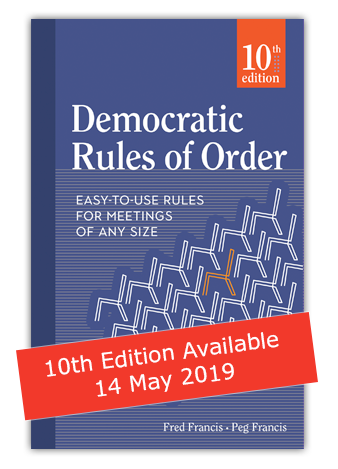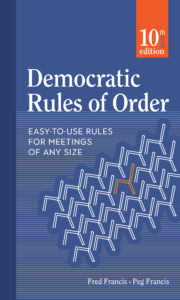Frequently asked questions
Table of Contents
Is Democratic Rules of Order very different from other parliamentary authorities?
Yes and No. They codify much common practice and on the surface meetings would sound the same with motions, seconding, voting, etc. but the rules are less dominant, deliberations are smoother, and equal rights exist in practice as well as in theory.
Since Democratic Rules of Order is so much shorter than most older rules, how can it be as reliable for large organizations to adopt for governing their meetings which might include some strongly divided opinions?
Progress is natural in today’s world and streamlining rules of order so that they are less obtrusive and are easier to understand does not reduce their reliability for large or small meetings. Democratic Rules of Order is not missing any regulation necessary for the best run meetings. Its rules have been adopted and tested by organizations of various kinds and sizes all over North America, and have been accepted by many as the ideal and most reliable parliamentary standard.
Does it contain anything unique?
There are three major differences from other rules of order:
- 1. It’s rule allowing informal discussion of an idea before forming a motion is sometimes a great time saver;
- 2. The mover’s privilege allowing the mover and members to reword a motion during discussion can make perfecting the wording of the motion easier. This rule can not be abused as a change requires a formal amendment if more than one member objects;
- 3. An amendment cannot be amended. Instead the motion can be quickly defeated without more discussion and a new motion proposed embodying the useful ideas from the discussion.
Why was this book written?
In hundreds of meetings, the authors frequently saw the need for simpler rules of order and searched diligently to find one, but without success. Nearly all were incomplete or were modifications of the same complex procedures. Finally, in December 1994, they decided to write a set of rules based only on democratic principles, common practice and common sense. The basic text was written in a week but it took years of refining and advice from executives, parliamentarians and others to perfect the rules.
Why is it called Democratic?
Because it preserves in meetings the fundamental principles of democracy: justice, equal individual rights, right of the majority to decide and the simplicity of good order.




